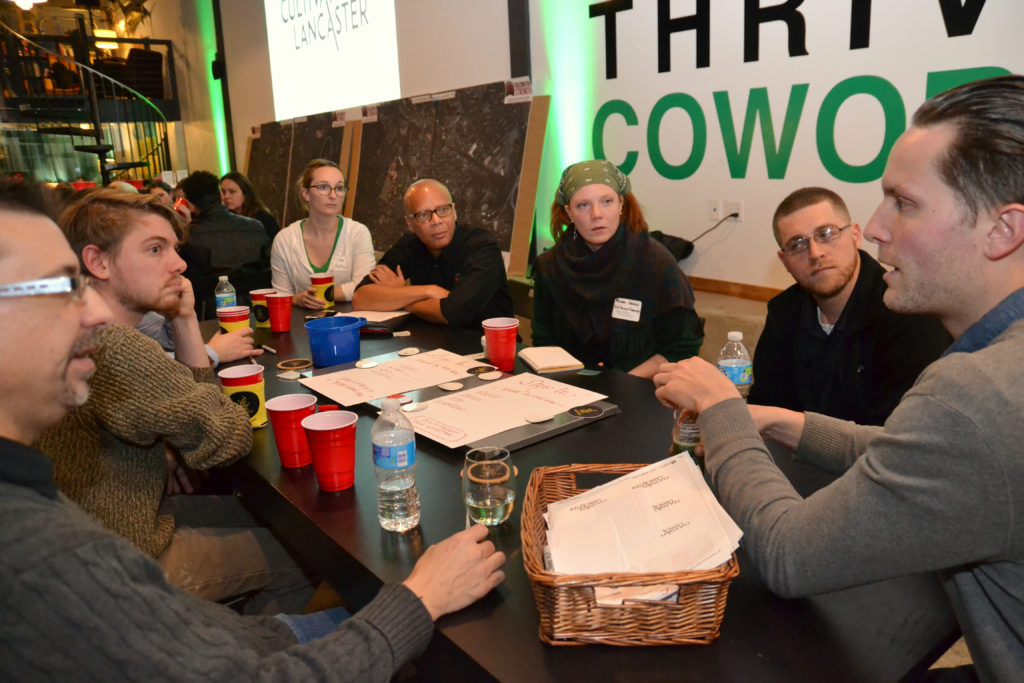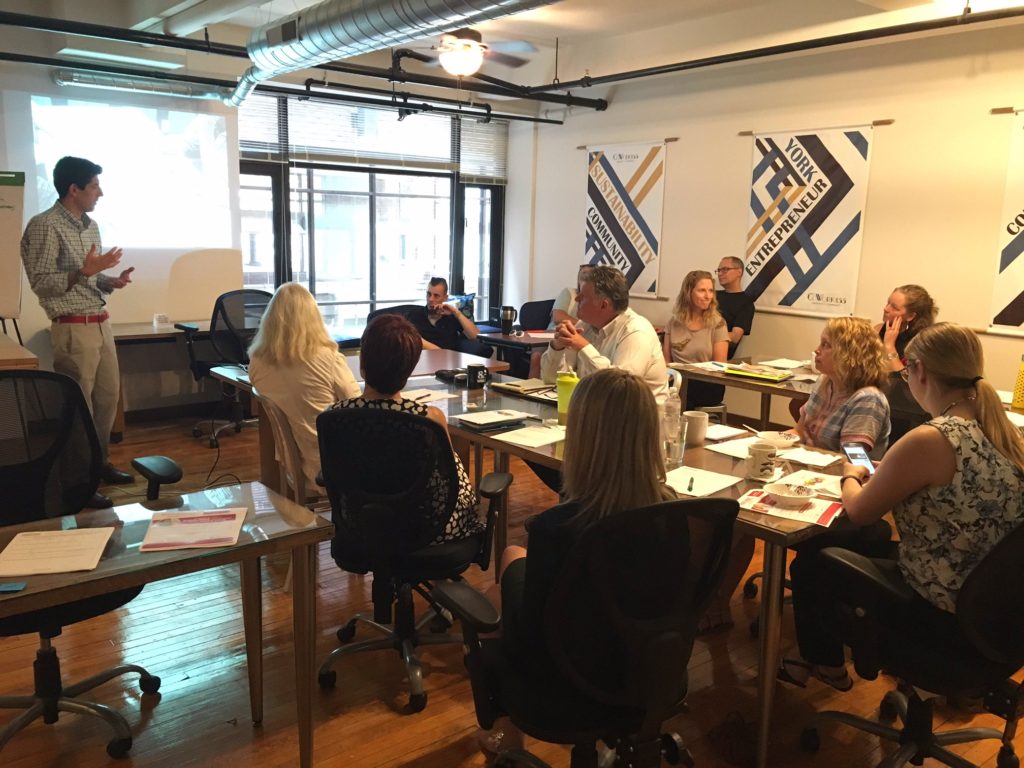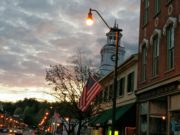It isn’t every day that AOL founder Steve Case comes to town with money burning a hole in his pocket. But on October 10, Case and J.D. Vance, author of the best-selling 2016 memoir Hillbilly Elegy, will ride into Central Pennsylvania on the sixth “Rise of the Rest” (ROTR) tour bus, looking to fund a promising startup. One local company will walk away with a $100,000 investment.
Case’s Revolution LLC, a Washington, D.C.-based venture capital firm, launched ROTR in 2014 to spark entrepreneurship across the country, not just in established (read: coastal) urban tech centers. Vance joined Revolution earlier this year to further promote startups in the heartland.

“Globalization and technology are irreversible forces, and what made Detroit, Cleveland and Omaha great decades ago cannot be restored with the wave of a wand,” wrote Case in a USA Today column. “As a nation, how do we heal the division between coastal economies that are enjoying larger and larger gains from economic change, and a large expanse of our country between the coasts that have nostalgic wishes for an unrecoverable economy of days gone by?”
Amazing. Unprecedented. Unparalleled. Superlatives cannot adequately capture how rare and exciting of an opportunity this is.Kevin Schreiber, York County Economic Alliance
“There is [another] way: Invest in and nurture the innovation and entrepreneurial talent that exist outside of Silicon Valley and New York, to build great companies and more prosperous communities in the rest of the country.”
So how big an opportunity is ROTR for Harrisburg-Lancaster-York?
“Amazing. Unprecedented. Unparalleled. Superlatives cannot adequately capture how rare and exciting of an opportunity this is,” says Kevin Schreiber, president and CEO of the York County Economic Alliance. “This is an incredible chance to engage industry, entrepreneurship, education, government, founders and startups around a common purpose — to innovate industry here in Central PA.”

David E. Black, president and CEO of the Harrisburg Regional Chamber and the Capital Region Economic Development Corporation views ROTR as a way to showcase the region — and the young businesses participating in the competition — on a national platform.
“There is a lot going on in our area regarding entrepreneurial activity and technology in particular,” he says. “South Central PA is not nationally known as a hotbed of technology development. I think this opportunity will open a lot of eyes around the country and even within our region.”
The hope is that ROTR will have an impact beyond October 10.

“We want to leverage this one-day event into a longer-term action plan,” explains Lisa Riggs, president of the Economic Development Company of Lancaster County. “[The goal is] to strengthen Central PA’s innovation ecosystem, including by engaging traditional business, addressing the gap in the startup funding continuum and ensuring the full breadth of resources is available to support entrepreneurs,”
“In York, there’ve been discussions of an Innovation District, shared research and development, and collaborative co-working spaces, all of which are necessary ingredients to a community’s success and evolution,” adds Schreiber. “ROTR could well be the impetus for a larger pivot point for our partnerships and stakeholders.”
Central PA has a strong and diverse business base, a history of entrepreneurship, an extraordinary quality of life and arguably almost unmatched access to markets.Lisa Riggs, Economic Development Company of Lancaster County
He expects that the region will build on the coordination it took to secure a visit from Case et al. (Lancaster EDC, the Harrisburg Regional Chamber & CREDC, Ben Franklin Technology Partners of Central and Northern PA and York Exponential all participated).
Central PA has both the resources and the challenges tailor-made for ROTR. (Other 2017 stops include Ann Arbor, Michigan; Indianapolis, Indiana; Columbus, Ohio; and Green Bay, Wisconsin. Two Pennsylvania companies have previously won funding: Philadelphia’s Scholly and Pittsburgh’s SolePower.)

“Central PA has a strong and diverse business base, a history of entrepreneurship, an extraordinary quality of life and arguably almost unmatched access to markets,” explains Riggs. “We also have strong educational institutions and significant quiet wealth. These are all assets. The gaps we’ve identified, based on what we’ve heard from startups and local investors, is the lack of certain types of capital, consistent with what Steve Case articulates, along with the opportunity to link more traditional businesses into the entrepreneurial ecosystem.”
“As a region, we have over 1.2 million in population,” says Schreiber. “Steve Case and ROTR’s hypothesis is spot on. Seamless integration of technology has democratized innovation so that it may occur anywhere. Central PA is a litmus test of that theory and it is proving accurate.”
When the bus rolls in on October 10, eight finalists from the region will pitch to Case for a $100,000 investment. To be eligible, startups must be within 75 miles of the three cities, have a live product or service in active beta, have measurable performance indicators, and be raising or about to raise an early-stage funding round. Criteria include a bold idea, scalability, potential for job creation and the quality of the team, execution, business model and supporting documents such as company website and pitch deck.

ROTR encourages startups in all industries to apply. Applicants from advanced manufacturing, healthcare, signal integrity, digital media, energy efficiency, advanced materials, medical devices, ed- and ag-tech sectors are considered likely standouts from Harrisburg-Lancaster-York. The deadline is 5 p.m. Tuesday, August 15. Finalists will be notified by September 15.
The day itself will include a fireside chat with Case and Vance, the pitch competition and a happy hour (all locations TBD). All the events are free but RSVPs are required.
“I am certainly hopeful that the annals of York’s history will show [ROTR] was a watershed moment,” muses Schreiber. “In World War II, York’s leading industrial patriarchs developed the York Plan, a template that was replicated across the country to convert manufacturing to munitions. That plan spurred significant innovation. We changed the world then and we can do it again today through technology, manufacturing, education, shared knowledge, brain power, and research and development.”
ELISE VIDER is news editor of Keystone Edge.
Ben Franklin Technology Partners is an investor in Keystone Edge.



